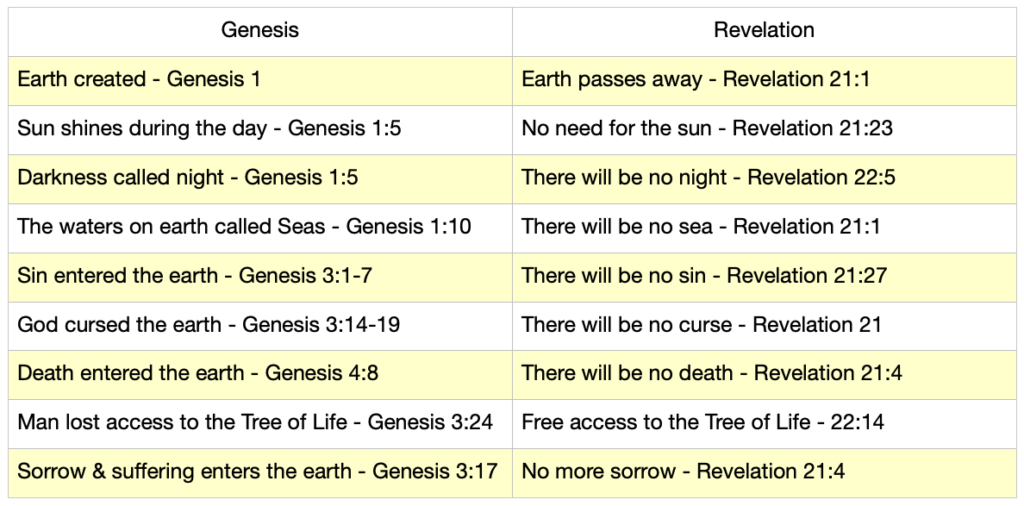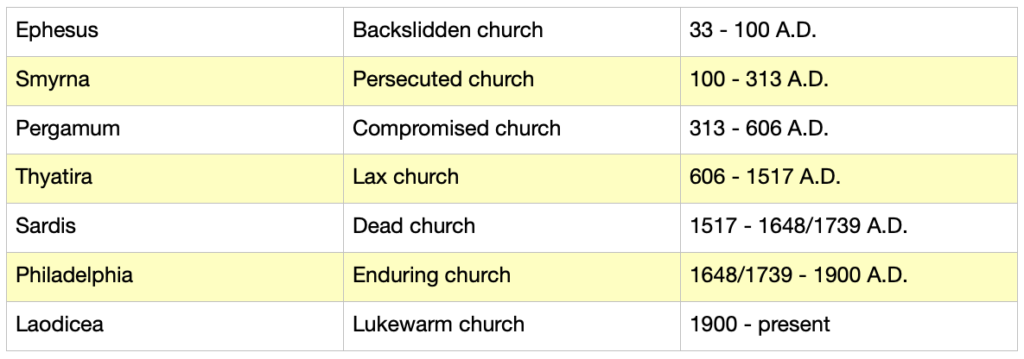Have you read through the book of Revelation recently? It is, like all books of the Bible, unique, interesting, and amazingly relevant for today. Besides, it has hundreds of references to other books of the Bible, in both the Old and New Testaments, proving how integrated the entire message of the Bible is. While Christians often avoid Revelation, whether out of fear or lack of understanding, it is the only book that promises a blessing to those who read it. (Revelation 1:3) The book of Revelation (about last things) also makes an ideal bookend together with Genesis (the book of beginnings), as the table below shows.

Revelation opens with a letter to each of seven churches, dictated to the apostle John by Jesus Himself. Each one of these churches had its own circumstances, weaknesses, admonition and promise of reward. While these churches did exist at the time when the letters were written, and faced the challenges mentioned in these letters, a phrase repeated in each of them alerts us to something more than we read on the surface: “He who has an ear, let him hear what the Spirit says to the churches.”
We learned in the gospels that when Jesus says, “He who has an ear…”, He meant spiritual ears — the ability to hear more than the natural ears could. Also, note the plural in churches : the letters were not only meant for the churches that received them.
Immediately, when one reads these letters, a question arises, “What about the other churches that existed at that time? Especially the more prominent ones, like the churches at Jerusalem, Rome, Philippi, Thessalonica, Antioch, and others. Prophecy scholars point to an interesting aspect in the selection of these churches, most importantly the specific order in which the letters appear in Revelation. A study of church history reveals the trends that dominated church culture as it went through different periods of time, correspond perfectly with recorded history.

Although these trends were accurate historically, they are also present today, with lukewarmness now the dominant one – the Laodicean church. Modern churches are (in general) wealthy, and think they have what they need: the buildings, the electronic equipment, the music and talents, etc. They certainly look successful, but in reality some are, as the letter to the Laodicean church says, “wretched, miserable, poor, blind, and naked.” The modern church is very attractive in the natural, but far from it spiritually; Jesus actually said He will vomit the lukewarm church out of His mouth – simply put, the lukewarm church makes Him sick.
What are the symptoms of a lukewarm church?
- The Great Commission (Matthew 28:19) is not emphasized
- Motivational speeches replaced in-depth preaching and teaching from the Bible
- Discipling of new believers is non-existent
- Jesus is not the object of their worship
- Prayer meetings are not held regularly, and are poorly attended
- Members are Biblically illiterate
- Adherence to political correctness as a means to avoid offence to sinners and the religious
- No reverence for the presence of the Lord in meetings
Only two out of the seven churches were commended: Smyrna, the persecuted church, and Philadelphia, the enduring church — and like the others, they also exist today. God always had a faithful remnant through the ages! Persecution has been around since the very beginning, and is intensifying these days. Our brothers and sisters in the Middle East, parts of Africa, China, North Korea, etc. pay a heavy price for following Jesus. There are also some churches in the West, and elsewhere, that remain faithful to the call in the midst of the temptation to become more secular and gain numerical growth. They still have zeal for missionary work, evangelism, sound teaching, and pure worship. These are the churches we need to seek after.
Hidden between the lines written to the seven churches is a prophetic timeline, detailing the church’s history about to unfold over the ensuing centuries. We have now arrived at the last one.
Now the Spirit expressly says that in latter times some will depart from the faith, giving heed to deceiving spirits and doctrines of demons… 1 Timothy 4:1
But know this, that in the last days perilous times will come: For men will be lovers of themselves, lovers of money, boasters, proud, blasphemers, disobedient to parents, unthankful, unholy, unloving, unforgiving, slanderers, without self-control, brutal, despisers of good, traitors, headstrong, haughty, lovers of pleasure rather than lovers of God, having a form of godliness but denying its power. And from such people turn away! 2 Timothy 3:1-5
“…having a form of godliness but denying its power.” This is the Laodicean church, and Paul advises us to turn away from it. We live in serious times, and the stakes are higher than we can imagine. Either Paul had some extremist views, or he knew something about the dangers of submitting ourselves to a lukewarm church.
We have work to do! The enemy of our souls works slowly and patiently; he introduces small doses of spiritual lukewarmness into our fellowships to neutralize us in the spiritual battle that is raging around us. Let us therefore be vigilant and alert; we must recognize the time that we live in, and what to do to be ready when Jesus comes.
It is time to look up!
Listen to our podcast on From darkness to light here
Listen to our podcast on The making of a miracle here
Sign up for our newsletter here


